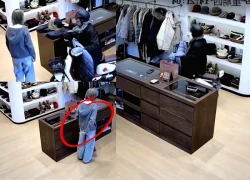Vatican: The smallest in the world, with a population of less than a thousand people but extremely interesting

2 | 0 Discuss | Share
After settling in Europe, Ms. Phuong Hang said she discovered many interesting things. One of them was that people who went to prison "paid in installments", or were even allowed to go home.
Many people wonder what "house arrest" is and how it is regulated?
Accordingly, serving sentences at home solves many problems regarding budget and facilities. This form is only applied to those who commit minor crimes, with a sentence of a few months.
In the judiciary, the phrases "house arrest", "home detention", "electronic monitoring" are understood as measures to detain prisoners at home instead of in prison. This form is not new in the world.
Home confinement was introduced in the United States in the late 20th century; the first inmate was sentenced to serve his sentence at home with monitoring equipment in 1983, and home confinement is now used in most states across the United States.
In Europe, the UK, Sweden, the Netherlands, some regions of Germany, France and Belgium have allowed prisoners to serve their sentences at home since before 2000. In Southeast Asia, Thailand and Singapore have both provided for home detention in their Criminal Code. Indonesia is also researching it.
Under home confinement, the court will assign a supervisor to supervise the inmate, and the inmate will be fitted with an electronic monitoring device and a global positioning system (GPS) on his ankle. The anklet will notify the inmate's location to the management and police.
In other words, if the prisoner goes away from home or commits a crime, the police will know. Living expenses such as food, accommodation, clothing and personal activities are all paid for by the prisoner.
"Inmates outside prison of course do not have to wear prison uniforms. They can wear suits or dresses as they like," said Kevin Mitchell, a lawyer in San Francisco (California, USA).
Typically, home detention is used for non-dangerous individuals who have not committed crimes involving harm or violence, or for first-time offenders; the sentence is short.
In Thailand, home detention is applied to prisoners sentenced to less than 3 months. In Russia, it is less than 4 months, and in Singapore, it is less than 4 weeks.
Prisoners who commit violent crimes, drug crimes, arson, intentional or unintentional harm to others, or have a history of being in and out of prison many times are not considered for home confinement.
Create opportunities for minor offenders
"Home detention solves many problems in terms of budget and facilities. The cost of keeping a prisoner in prison or building more prisons costs the budget a lot of money," wrote expert Jody Klein-Saffran of the US Department of Justice in a study on home detention.
According to this expert, the purpose of confining criminals is ultimately to restrict the freedom of the prisoner. If the prisoner is serving his sentence at home and has a supervisor, random checks, supervision from family and the surrounding community, and monitoring devices, the prisoner's freedom is clearly also restricted.
Home detention is for people who have committed minor crimes and are not a threat to society, so keeping them in prison is a waste of budget. Prison should be reserved for more serious criminals who need to be isolated from society.
According to a 2016 report from La Crosse County, Wisconsin, it costs an average of $83 a day to keep a criminal in jail. With home confinement and monitoring, the cost drops to just $6 a day.
Not only does it save money, in fact, prisoners serving their sentences at home also contribute a significant amount of money to the budget.
Inmates who are “home-bound†can still work as normal while on probation. In addition, the person who has the monitoring device must pay a “rent†for the device, ranging from $5 to $25 a day, up to $800 a month, according to the report. In some cases, this is more expensive than the inmate’s rent.
Or in Thailand, due to the large number of criminals sentenced to less than 3 months, all criminals are fitted with tracking devices and allowed to serve their sentences locally. However, each day, prisoners must pay 200 THB (6 USD) for the tracking device according to the provisions of the Criminal Code. If the prisoner cannot afford to pay, they can choose to do community service with a salary of 200 THB/day in return.
"But most importantly, serving sentences at home creates an opportunity for minor offenders to not be shunned by the community after returning from prison and to still be able to reintegrate into the community," said expert Klein-Saffran.
Does it reduce the deterrence of the law?
On the afternoon of November 12, discussing at the group meeting (6th session of the 14th National Assembly) on the draft Law on Enforcement of Criminal Judgments (amended), delegate Ho Duc Phoc, State Auditor General, proposed studying the form of "home detention" to reduce pressure on prison overload and apply it to cases of minor crimes, with little possibility of posing a danger to society.
Delegate Ho Duc Phoc’s proposal received mixed opinions. In addition to some delegates supporting it, there were also concerns that this form would reduce the deterrent effect of the law.
In fact, according to international practice, this is hardly a controversial issue. Lawmakers who apply home detention all affirm that those who are subject to this measure have committed minor crimes and have short sentences. For such subjects, home detention is not a humane measure at all, but a form of prison.
"Those who have experienced home detention understand how psychologically burdensome it is. They are not professional criminals, sometimes they just commit crimes unintentionally. This form of detention directly affects the self-esteem of the offender and is more self-critical than prison bars," the Australian Institute of Criminology asserted.
Johnny Page, now a youth counselor in Chicago who was fitted with a GPS device for home confinement after 23 years in an Illinois prison, told Wired: "You're not fighting for a shower, you're not fighting for a phone to call your family, but you're still in prison. It's just a different form of confinement."
In a study by German judge Hans-Joerg Albrecht on home enforcement with the help of tracking devices in five European countries (France, the Netherlands, Germany, the UK and Sweden), the sentence completion rate ranged from 90-95% with a resistance rate of around 5-11%.
But home detention is not without its drawbacks. Much of the controversy surrounds how the surveillance devices work.
According to the Thai Department of Corrections, investing in real-time monitoring equipment is quite expensive. On the social side, prisoners in home confinement have to pay a daily fee for the equipment, making it difficult for some poor families to afford.
In addition, according to the agency, electronic devices still face the risk of software errors, returning incorrect results to the monitoring agency, thereby affecting the person serving the sentence.
The pomegranate tree grows on Qin Shi Huang's tomb and the terrible mystery behind!  Hoàng Phúc20:35:39 06/04/2025Although the tomb of Emperor Qin Shi Huang has been discovered for decades, archaeologists insist that it is impossible to enter inside. One of the most well-known is that there is still a large amount of mercury inside.
Hoàng Phúc20:35:39 06/04/2025Although the tomb of Emperor Qin Shi Huang has been discovered for decades, archaeologists insist that it is impossible to enter inside. One of the most well-known is that there is still a large amount of mercury inside.

2 | 0 Discuss | Share

3 | 0 Discuss | Share

3 | 0 Discuss | Share

2 | 0 Discuss | Share

1 | 0 Discuss | Share

3 | 0 Discuss | Share

3 | 0 Discuss | Share

3 | 0 Discuss | Share

3 | 1 Discuss | Share

3 | 0 Discuss | Share

4 | 1 Discuss | Share

0 | 0 Discuss | Share



3 | 0 Discuss | Report